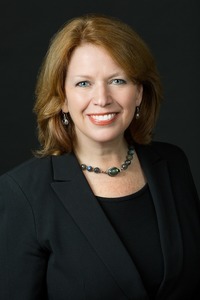ChristianaCare Connects with Community Partners to Address Social Determinants of Health in Delaware
View from the C-Suite: Bettina Tweardy Riveros, Chief Health Equity Officer at ChristianaCare
// By Ndome Yvonne Essoka //
 When Bettina Tweardy Riveros joined ChristianaCare as chief health equity officer in 2016, she assumed responsibility for engaging community stakeholders in partnerships that advance ChristianaCare’s vision for a healthy Delaware.
When Bettina Tweardy Riveros joined ChristianaCare as chief health equity officer in 2016, she assumed responsibility for engaging community stakeholders in partnerships that advance ChristianaCare’s vision for a healthy Delaware.

Bettina Tweardy Riveros, chief health equity officer, ChristianaCare
According to Riveros, the guiding principles of building strong community partnerships can be summed up in the phrase “nothing about us, without us.” This method of engaging community partners entails active listening. “We reached out to community partners, actively listened to them, and spent time assuring them that we understood their community needs, and that we planned to include that in our framework,” she says.
In 2019, ChristianaCare ushered in its first “community investment fund,” a unique strategic initiative based on collaboration with community partners to solve the social, behavioral, and environmental factors that amplify adverse health outcomes. Using its “bio-psycho-social” model of care, ChristianaCare works to address the conditions people grow, live, and play in, known as the social determinants of health.
This joint effort allows for true partnership, and it provides an avenue for ChristianaCare to further expand its health equity endeavors in diverse and inclusive ways.
ChristianaCare is currently Delaware’s largest state hospital system, with an extensive network of outpatient services, home health care, urgent care centers, three hospitals (including one in Maryland) with a total of 1,299 beds, a free-standing emergency department, a Level III neonatal intensive care unit, a comprehensive stroke center, and regional centers for heart care, cancer care, and women’s health. The system has partnered with scores of nonprofit and community organizations.
Riveros oversees the organization’s health policy agenda, focusing on legislative policy development, ongoing innovative population health, and health care reform — all through a culturally competent lens that addresses community needs and values. “We have a commitment to the good health of our neighbors,” says Riveros, also the senior vice president of government affairs and community engagement at ChristianaCare.
The Bio–Psycho–Social Approach
ChristianaCare uses a bio-psycho-social approach to address health equity. This coordinated, comprehensive approach to care allows ChristianaCare to support its community members on their journey to health. Riveros describes the complexity some patients face: “A patient could be in and out of a hospital with persistent diabetes. Without a fridge to put their insulin in, or access to nutritional food, this person may be functionally unable to get better. The same goes for the mother who needs transportation to get to her prenatal appointments, and to those who are unable to secure employment to offset their exorbitant healthcare costs.”
“A patient could be in and out of a hospital with persistent diabetes. Without a fridge to put their insulin in, or access to nutritional food, this person may be functionally unable to get better.”
Bettina Tweardy Riveros
ChristianaCareChristianaCare recognizes these needs and provides solutions. From hiring people in the community to serve as community health workers, to providing transportation services for those in need, ChristianaCare focuses on bio-psycho-social needs in a holistic way that addresses the underlying factors driving poor outcomes.
The Community Investment Fund
Last year, ChristianaCare instituted its first “community investment fund” initiative. It supports key areas that ultimately affect a person’s overall health. “One of ChristianaCare’s obligations as a nonprofit organization is to conduct health needs assessments and subsequently develop community health implementation plans based on the results,” Riveros says. “The community investment fund is the culmination of this effort and is funded using ChristianaCare’s community benefit dollars.”
Target areas for the fund include housing stability, food insecurity, economic stability, maternal health, mental health, violence, substance use disorders, primary care, dental care, and others. Awards are granted to organizations that fall within one or more of these core categories, and metrics/guidelines are individually tailored based on impact and need. Organizations such as the Latin American Community Center (LACC) and the Central Baptist Community Development Corporation are among those that received funding last year.
“ChristianaCare was looking to invest back into the community,” Riveros says, sharing her enthusiasm about “the tremendous job many of the community investment fund partners have been doing.” In particular, partnerships have increased the overall capacity for community organizations to not only engage in, but also facilitate, integrated care.
Response to the COVID-19 Pandemic
The current pandemic has changed the healthcare system’s priorities overall, and community partnerships have provided a safety net of specialized resources. Interpersonal violence in Delaware, for example, has increased during the COVID-19 pandemic, and contributions of the Delaware Coalition Against Domestic Violence have been timely.
“When COVID-19 hit, we met with the health equity team and discussed the impact it would have on our communities that were already at high risk. We knew there would be a disproportionate impact and so we worked around the clock to make a difference,” Riveros says.
ChristianaCare set up community care centers in some of Delaware’s most underserved communities. The LACC and Kingswood Community Center were the first two. These centers addressed transportation, health insurance, and language barriers that prevented community members from getting the care they needed. Riveros points out that positive test rates ranged from 13 percent at Kingswood Community Center all the way up to 24 percent at the LACC.
“When COVID-19 hit, we met with the health equity team and discussed the impact it would have on our communities that were already at high risk; we knew there would be a disproportionate impact and so we worked around the clock to make a difference.”
Bettina Tweardy Riveros
ChristianaCareThese high numbers, she states, “may be attributed to the fact that many of these community members lived in multigenerational homes, were often employed in essential worker positions, had lack of access to culturally appropriate information about COVID, and faced a lack of access to appropriate personal protection equipment.”
To supplement such comprehensive care, ChristianaCare made use of its data-powered care coordination service called CareVio. With its focus on population health and value-based care, CareVio supports services that enable providers to work with patients to optimize health outcomes. The system integrates all available sources of a person’s health data, including admission visits, physician visits, lab results, pharmaceutical use, and claims data. It includes initiatives like symptom monitoring and virtual care, providing COVID-19 resources to those in need. These programs reduce the need for in-person visits, allowing people to monitor their daily health status, and provide virtual care and testing options as directed by a provider.
Nothing About Us, Without Us
Riveros’ advice to other health systems preparing to engage in this work is to make sure that they “recognize the amount of work that grassroots organizations have already contributed to many community initiatives prior to any health system involvement.” Riveros stresses the importance of “giving deference to the groundwork these partners have laid.” She adds, “It has been, and will always be, important to ChristianaCare to make sure that their community partners not only are heard but also have their needs met in a compassionate and generous manner.”
Ndome Yvonne Essoka is a third-year law student at William & Mary Law School, with a heavy interest in health law and social justice. Prior to law school, she received her master’s in public health from Rutgers University in 2016 and spent two years working for the U.S. Department of Health and Human Services on health care quality issues in collaboration with different federal agencies such as the FDA.
